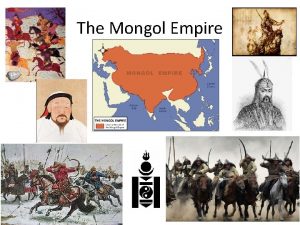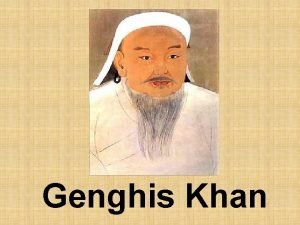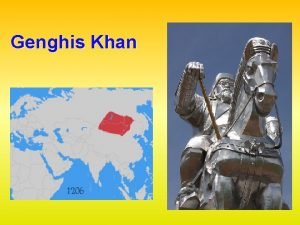Social Impacts of Genghis Khan and the Mongols





- Slides: 5

Social Impacts of Genghis Khan and the Mongols William Berglund and Emmet Moore

Slavery • Genghis enlisted slaves to become part of the empire and war machine • Slaves were tasked to three jobs, laborer's, specialist artisans and cannon fodder • In battle, captured townsfolk from the previous town were put at the front of the army, their bodies used to fill moats or to stop enemy archers from firing their arrows as they didn’t know which ones was their enemies or friends • Mongols could not be slaves

Laws • Forbids the selling of women into marriage • All children are legitimate • Forbids theft of animals • Turn in found goods or face the punishment of execution • Hunting was banned between March and October • Complete religious freedom • Khan is elected by Khuriltai • Group responsibility and group guilt • The Yassa, a scripture announcing the laws put in place by Genghis after being elected leader of the united Mongol tribes

Religion • Genghis had appointed religious freedom across the empire • Much of the Muslim population in Khwarazm and the Khara Khitai empire supported Genghis as he was religiously tolerant, unlike Kuchlug who was hostile to Islam • Many people believed that the winner in battle was chosen by god • Due to his many battle successes, Genghis was viewed as a 'mandate of god' by much of the opposing forces, rallying more support for him • Burkhan Khaldun, the mountain Genghis used to pray for victory at before embarking on his many conquests

Loyalty and fear • Genghis had gained support in two ways, either you were loyal to him or you submitted to him through fear • 17 out of the 19 at the Baljuna covenant were not of kin, which meant that they were they out of loyalty • Many of the generals and leaders were appointed on loyally and not whethere were family • Religious freedom allowed Genghis to gain support all over the empire, especially in the Islamic world • Many of the neighboring lands of the Mongol's supported Genghis's ideas such as the khitai and thus swore loyalty to him








